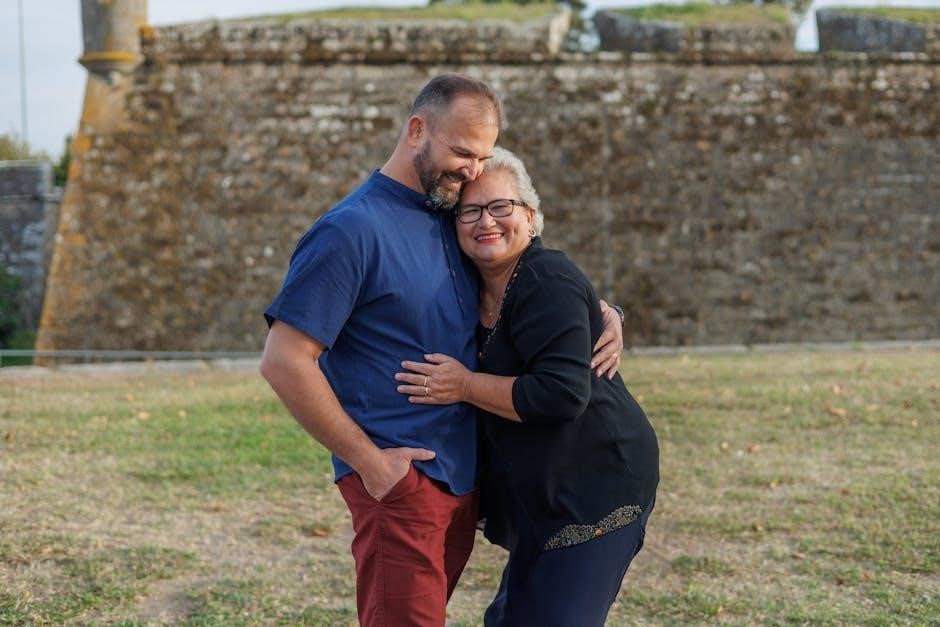Mother Teresa’s timeless philosophy, “Do It Anyway,” inspires millions to embrace selfless service and perseverance. This powerful directive, rooted in her unwavering faith, encourages individuals to act with compassion despite life’s challenges. Its essence lies in doing good without expectation of recognition, a principle she lived by tirelessly.
Overview of ‘Do It Anyway’
Mother Teresa’s “Do It Anyway” philosophy is a powerful call to action that emphasizes selflessness, perseverance, and faith. Originating from a poem she displayed in her Calcutta orphanage, this philosophy encourages individuals to continue doing good even when faced with indifference, criticism, or forgetting. The poem, often attributed to her, outlines a paradoxical yet profound truth: the act of giving and serving is not about external validation but about staying true to one’s values and faith.
The core message of “Do It Anyway” revolves around themes of unconditional service, humility, and trust in a higher purpose. It challenges individuals to rise above worldly concerns, such as recognition or gratitude, and instead focus on the inherent worth of their actions. This philosophy has resonated globally, inspiring countless people to embrace compassion and kindness in their daily lives.
Key ideas include:
- Not seeking recognition for good deeds.
- Enduring criticism while staying committed to one’s values.
- Understanding that true fulfillment comes from within.
- Trust in a higher purpose, even when outcomes are uncertain.

Mother Teresa’s “Do It Anyway” is more than a philosophy; it is a way of life that transcends religion and culture, reminding us that the act of giving is its own reward. This timeless message continues to inspire individuals and organizations to integrate selflessness and purpose into their actions.
Key Takeaways
Mother Teresa’s “Do It Anyway” philosophy offers profound lessons for living a life of purpose and compassion. It emphasizes the importance of selflessness, perseverance, and faith, even in the face of adversity or indifference. The philosophy reminds us that the value of our actions lies not in external validation but in their inherent worth.
Key takeaways include:
- Selflessness over recognition: True fulfillment comes from serving others without expecting gratitude or acknowledgment.
- Perseverance in adversity: Continue doing good even when faced with criticism, forgetfulness, or jealousy.
- Humility and trust: Understand that the ultimate judgment of our actions lies not with others but with a higher power.
- Inner fulfillment: The act of giving and serving is its own reward, regardless of outcomes.

This philosophy challenges individuals to rise above worldly concerns and focus on the greater good. It encourages us to embrace compassion, kindness, and faith, even when the results of our efforts are uncertain. Mother Teresa’s teachings remain timeless, inspiring people to live with purpose and integrity in a world often driven by self-interest. Her message is a powerful reminder that true meaning is found in selfless service and unwavering commitment to one’s values.

Background
Mother Teresa’s “Do It Anyway” philosophy emerged from her decades of selfless service in Calcutta, where she dedicated her life to caring for the poor and marginalized; This guiding principle, rooted in her faith, reflects her unwavering commitment to compassion and humility in the face of adversity.
Mother Teresa’s Life and Mission

Mother Teresa, born Anjezë Gonxhe Bojaxhiu in 1910, was a Catholic nun who devoted her life to serving the poorest of the poor in Kolkata, India. Her mission began in 1948 when she received a divine call to leave her convent and serve the marginalized. Founding the Missionaries of Charity in 1950, she established orphanages, clinics, and shelters for the destitute, embodying her belief that “love is the fruit of silence” and “service is the fruit of love.”
Her work transcended borders, earning global recognition, including the Nobel Peace Prize in 1979. Yet, Mother Teresa faced immense challenges, including skepticism and criticism, but remained steadfast in her commitment to compassion. Her philosophy of “Do It Anyway” emerged from her unwavering faith and the conviction that true fulfillment lies in selfless service, regardless of recognition or reward.
Despite her international acclaim, Mother Teresa’s life was marked by personal trials, including a period of spiritual darkness often referred to as the “dark night of the soul.” This paradox of deep faith intertwined with inner struggles only strengthened her resolve to serve others, leaving a legacy of love and humility that continues to inspire millions worldwide.
Origin of the Philosophy

The philosophy of “Do It Anyway” is deeply rooted in Mother Teresa’s unwavering faith and her experiences serving the marginalized. This powerful message was first articulated in a poem she kept on the wall of her children’s home in Calcutta. The poem, which has since become synonymous with her legacy, emphasizes the importance of selfless action regardless of recognition or reward. Its simple yet profound words, such as “The good you do today will often be forgotten. Do good anyway,” reflect her belief that true fulfillment comes from serving others without expectation.
The philosophy gained widespread attention after Mother Teresa shared it with a reporter who asked about her challenges. Her response, encapsulated in the poem, resonated globally, inspiring individuals and organizations to embrace compassion and perseverance. While the poem is often attributed to Mother Teresa, it is believed to have been written by Kent Keith, an American author, and later popularized by her. Regardless of its origin, the message aligns perfectly with her life’s mission and continues to serve as a guiding principle for those seeking to make a difference in the world.
Today, “Do It Anyway” remains a timeless call to action, encouraging people to act with kindness and humility, even in the face of adversity. Its enduring relevance lies in its universal appeal, transcending religious and cultural boundaries to inspire a global movement of compassion and service.

Core Principles
The philosophy of “Do It Anyway” centers on selfless service, perseverance, and humility. It emphasizes doing good without expecting recognition, trusting in divine purpose, and maintaining compassion amidst adversity. These principles, rooted in Mother Teresa’s faith, inspire individuals to act with kindness and integrity, regardless of outcomes or challenges faced.
The Philosophy Explained
Mother Teresa’s “Do It Anyway” philosophy is a profound call to selfless service and unwavering commitment to goodness. It emphasizes acting with compassion and integrity, regardless of recognition or outcomes. This principle, central to her mission, encourages individuals to persist in doing good even when faced with indifference or adversity. The philosophy is deeply rooted in her faith, as she believed her work was a divine calling, giving her the strength to continue despite challenges.
The essence of “Do It Anyway” lies in its universality. It is not confined to religious or spiritual contexts but applies to everyday life, inspiring individuals to embrace humility and kindness. Mother Teresa’s example shows that true fulfillment comes from serving others without expectation of reward, aligning with a higher purpose rather than seeking external validation. This mindset fosters resilience and inner peace, even in the face of setbacks or unappreciated efforts.
Paradox of Selflessness
Mother Teresa’s “Do It Anyway” philosophy reveals a profound paradox of selflessness: giving entirely of oneself while finding fulfillment in the act itself, not in recognition or reward. This paradox lies at the heart of her teachings, emphasizing that true service requires detachment from outcomes and appreciation. Despite her tireless efforts, Mother Teresa often faced criticism and misunderstanding, yet she persisted, embodying the idea that selflessness is not about external validation but about aligning with a higher purpose.

This paradox also reflects the tension between human desire for acknowledgment and the divine call to serve unconditionally. Mother Teresa’s own life illustrated this struggle, as she poured her heart into caring for the marginalized while grappling with inner doubts and feelings of isolation. Her faith, however, sustained her, allowing her to embrace the paradox and find peace in her mission.
The paradox of selflessness reminds us that serving others is both a sacrifice and a source of profound joy. It challenges individuals to let go of ego and expectations, trusting that the value of their actions lies in their inherent goodness. Mother Teresa’s example shows that embracing this paradox leads to a life of purpose and fulfillment, even in the face of adversity. Her legacy continues to inspire individuals to navigate this paradox with courage and compassion.

Application
Mother Teresa’s “Do It Anyway” philosophy offers a practical guide for applying selfless service in everyday life. Its universal appeal lies in its simplicity and relevance to individuals, communities, and organizations. By embracing this mindset, people can integrate compassion and integrity into their daily actions, fostering a more empathetic and responsible world.
In personal life, the philosophy encourages individuals to act with kindness regardless of recognition or reward. It inspires people to volunteer, support those in need, and stand up for justice, even when the impact may seem small. For businesses, “Do It Anyway” serves as a call to prioritize ethical practices and social responsibility, ensuring that profit is not the sole measure of success.
The philosophy also resonates in professional settings, urging individuals to maintain their values and integrity, even in challenging environments. It reminds us that true fulfillment comes from aligning our actions with a higher purpose, rather than seeking external validation. By living this philosophy, we can create meaningful change, one selfless act at a time.
Ultimately, “Do It Anyway” is a timeless reminder that service, compassion, and perseverance are essential for building a better world. Its application extends beyond individual actions to inspire collective efforts, proving that even small acts of kindness can have a profound impact when done with sincerity and love.
